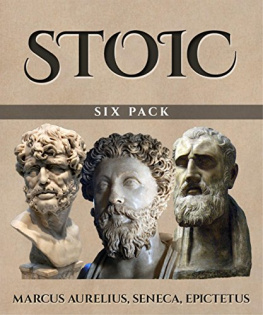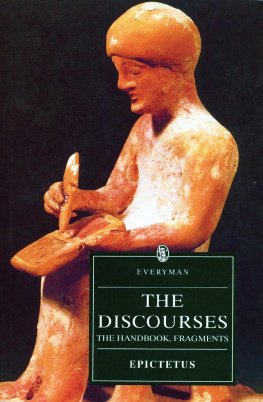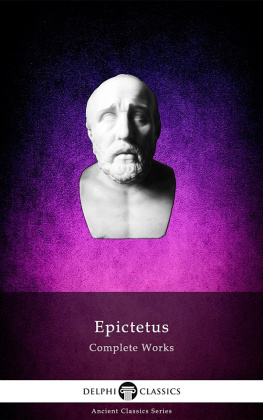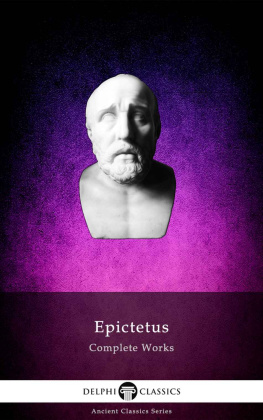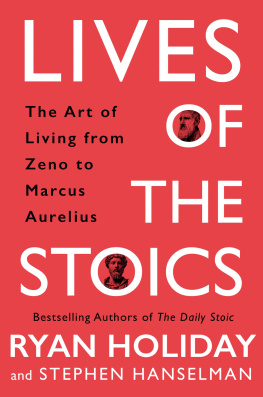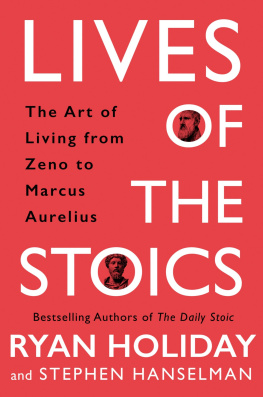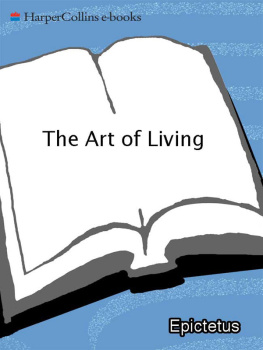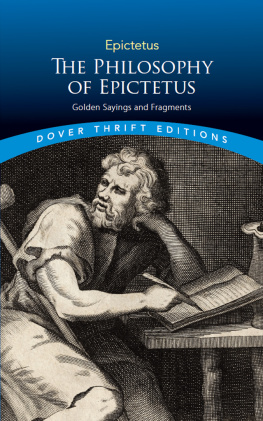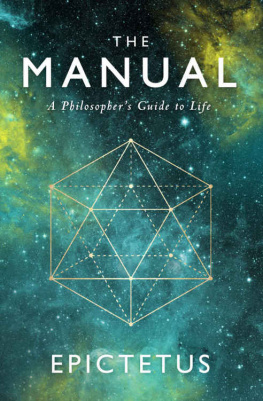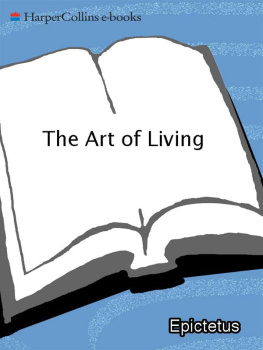Epictetus - Enchiridion: The Stoics Manual for Living
Here you can read online Epictetus - Enchiridion: The Stoics Manual for Living full text of the book (entire story) in english for free. Download pdf and epub, get meaning, cover and reviews about this ebook. year: 2007, publisher: Bukamerica Inc, genre: Religion. Description of the work, (preface) as well as reviews are available. Best literature library LitArk.com created for fans of good reading and offers a wide selection of genres:
Romance novel
Science fiction
Adventure
Detective
Science
History
Home and family
Prose
Art
Politics
Computer
Non-fiction
Religion
Business
Children
Humor
Choose a favorite category and find really read worthwhile books. Enjoy immersion in the world of imagination, feel the emotions of the characters or learn something new for yourself, make an fascinating discovery.

- Book:Enchiridion: The Stoics Manual for Living
- Author:
- Publisher:Bukamerica Inc
- Genre:
- Year:2007
- Rating:5 / 5
- Favourites:Add to favourites
- Your mark:
- 100
- 1
- 2
- 3
- 4
- 5
Enchiridion: The Stoics Manual for Living: summary, description and annotation
We offer to read an annotation, description, summary or preface (depends on what the author of the book "Enchiridion: The Stoics Manual for Living" wrote himself). If you haven't found the necessary information about the book — write in the comments, we will try to find it.
Enchiridion: The Stoics Manual for Living — read online for free the complete book (whole text) full work
Below is the text of the book, divided by pages. System saving the place of the last page read, allows you to conveniently read the book "Enchiridion: The Stoics Manual for Living" online for free, without having to search again every time where you left off. Put a bookmark, and you can go to the page where you finished reading at any time.
Font size:
Interval:
Bookmark:
The Enchiridion By Epictetus
Translated by Elizabeth Carter
1. Some things are in our control and others not. Things in our control are opinion, pursuit, desire, aversion, and, in a word, whatever are our own actions. Things not in our control are body, property, reputation, command, and, in one word, whatever are not our own actions.
The things in our control are by nature free, unrestrained, unhindered; but those not in our control are weak, slavish, restrained, belonging to others. Remember, then, that if you suppose that things which are slavish by nature are also free, and that what belongs to others is your own, then you will be hindered. You will lament, you will be disturbed, and you will find fault both with gods and men. But if you suppose that only to be your own which is your own, and what belongs to others such as it really is, then no one will ever compel you or restrain you. Further, you will find fault with no one or accuse no one. You will do nothing against your will. No one will hurt you, you will have no enemies, and you not be harmed.
Aiming therefore at such great things, remember that you must not allow yourself to be carried, even with a slight tendency, towards the attainment of lesser things. Instead, you must entirely quit some things and for the present postpone the rest. But if you would both have these great things, along with power and riches, then you will not gain even the latter, because you aim at the former too: but you will absolutely fail of the former, by which alone happiness and freedom are achieved.
Work, therefore to be able to say to every harsh appearance, "You are but an appearance, and not absolutely the thing you appear to be." And then examine it by those rules which you have, and first, and chiefly, by this: whether it concerns the things which are in our own control, or those which are not; and, if it concerns anything not in our control, be prepared to say that it is nothing to you.
2. Remember that following desire promises the attainment of that of which you are desirous; and aversion promises the avoiding that to which you are averse. However, he who fails to obtain the object of his desire is disappointed, and he who incurs the object of his aversion wretched. If, then, you confine your aversion to those objects only which are contrary to the natural use of your faculties, which you have in your own control, you will never incur anything to which you are averse. But if you are averse to sickness, or death, or poverty, you will be wretched. Remove aversion, then, from all things that are not in our control, and transfer it to things contrary to the nature of what is in our control. But, for the present, totally suppress desire: for, if you desire any of the things which are not in your own control, you must necessarily be disappointed; and of those which are, and which it would be laudable to desire, nothing is yet in your possession. Use only the appropriate actions of pursuit and avoidance; and even these lightly, and with gentleness and reservation.
3. With regard to whatever objects give you delight, are useful, or are deeply loved, remember to tell yourself of what general nature they are, beginning from the most insignificant things. If, for example, you are fond of a specific ceramic cup, remind yourself that it is only ceramic cups in general of which you are fond. Then, if it breaks, you will not be disturbed. If you kiss your child, or your wife, say that you only kiss things which are human, and thus you will not be disturbed if either of them dies.
4. When you are going about any action, remind yourself what nature the action is. If you are going to bathe, picture to yourself the things which usually happen in the bath: some people splash the water, some push, some use abusive language, and others steal. Thus you will more safely go about this action if you say to yourself, "I will now go bathe, and keep my own mind in a state conformable to nature." And in the same manner with regard to every other action. For thus, if any hindrance arises in bathing, you will have it ready to say, "It was not only to bathe that I desired, but to keep my mind in a state conformable to nature; and I will not keep it if I am bothered at things that happen.
5. Men are disturbed, not by things, but by the principles and notions which they form concerning things. Death, for instance, is not terrible, else it would have appeared so to Socrates. But the terror consists in our notion of death that it is terrible. When therefore we are hindered, or disturbed, or grieved, let us never attribute it to others, but to ourselves; that is, to our own principles. An uninstructed person will lay the fault of his own bad condition upon others. Someone just starting instruction will lay the fault on himself. Some who is perfectly instructed will place blame neither on others nor on himself.
6. Don't be prideful with any excellence that is not your own. If a horse should be prideful and say, " I am handsome," it would be supportable. But when you are prideful, and say, " I have a handsome horse," know that you are proud of what is, in fact, only the good of the horse. What, then, is your own? Only your reaction to the appearances of things. Thus, when you behave conformably to nature in reaction to how things appear, you will be proud with reason; for you will take pride in some good of your own.
7. Consider when, on a voyage, your ship is anchored; if you go on shore to get water you may along the way amuse yourself with picking up a shellish, or an onion. However, your thoughts and continual attention ought to be bent towards the ship, waiting for the captain to call on board; you must then immediately leave all these things, otherwise you will be thrown into the ship, bound neck and feet like a sheep. So it is with life. If, instead of an onion or a shellfish, you are given a wife or child, that is fine. But if the captain calls, you must run to the ship, leaving them, and regarding none of them. But if you are old, never go far from the ship: lest, when you are called, you should be unable to come in time.
8. Don't demand that things happen as you wish, but wish that they happen as they do happen, and you will go on well.
9. Sickness is a hindrance to the body, but not to your ability to choose, unless that is your choice. Lameness is a hindrance to the leg, but not to your ability to choose. Say this to yourself with regard to everything that happens, then you will see such obstacles as hindrances to something else, but not to yourself.
10. With every accident, ask yourself what abilities you have for making a proper use of it. If you see an attractive person, you will find that self-restraint is the ability you have against your desire. If you are in pain, you will find fortitude. If you hear unpleasant language, you will find patience. And thus habituated, the appearances of things will not hurry you away along with them.
11. Never say of anything, "I have lost it"; but, "I have returned it." Is your child dead? It is returned. Is your wife dead? She is returned. Is your estate taken away? Well, and is not that likewise returned? "But he who took it away is a bad man." What difference is it to you who the giver assigns to take it back? While he gives it to you to possess, take care of it; but don't view it as your own, just as travelers view a hotel.
12. If you want to improve, reject such reasonings as these: "If I neglect my affairs, I'll have no income; if I don't correct my servant, he will be bad." For it is better to die with hunger, exempt from grief and fear, than to live in affluence with perturbation; and it is better your servant should be bad, than you unhappy.
Begin therefore from little things. Is a little oil spilt? A little wine stolen? Say to yourself, "This is the price paid for apathy, for tranquillity, and nothing is to be had for nothing." When you call your servant, it is possible that he may not come; or, if he does, he may not do what you want. But he is by no means of such importance that it should be in his power to give you any disturbance.
Next pageFont size:
Interval:
Bookmark:
Similar books «Enchiridion: The Stoics Manual for Living»
Look at similar books to Enchiridion: The Stoics Manual for Living. We have selected literature similar in name and meaning in the hope of providing readers with more options to find new, interesting, not yet read works.
Discussion, reviews of the book Enchiridion: The Stoics Manual for Living and just readers' own opinions. Leave your comments, write what you think about the work, its meaning or the main characters. Specify what exactly you liked and what you didn't like, and why you think so.

